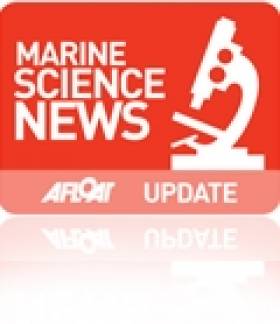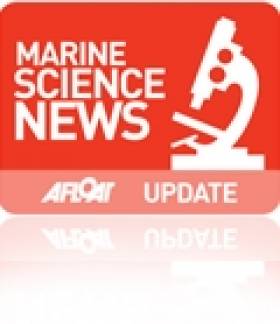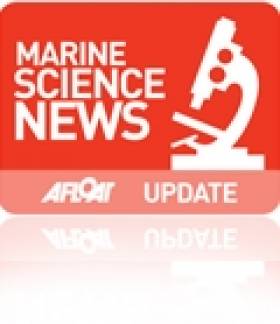Displaying items by tag: Atlantic Summer School
Science Students Study Cold Water Coral Ecosystems In Irish Waters
#MarineScience - The national research vessel RV Celtic Explorer has become a ‘floating university’ for 14 postgraduate students from seven countries – including Ireland – who have a unique chance to study cold water coral systems in their living environment in Irish waters.
The Atlantic Summer School, which runs till 17 September, involves a multidisciplinary investigation of cold water coral ecosystems of the Belgica Mound Province, which is a special area of conservation (SAC) some 150km south-west of Ireland.
As previously reported on Afloat.ie, the initiative is a collaboration between the Strategic Marine Alliance for Research and Training (SMART) in Ireland and the Alfred Wegener Institute Helmholtz Centre for Polar and Marine Research (AWI) in Germany.
“Cold water corals live at ocean depths of around 1,000m and build reefs which over millennia can reach up to 300m high," explained Dr Pauhla McGrane, national co-ordinator of SMART Ireland. "These giant coral mounds act as biological “hot-spots” and provide habitats for a variety of marine life.
“The Atlantic Summer School will enable postgraduate students to survey these mounds and collect data that will ultimately increase our understanding of these unique environments," she added.
“It’s not everyday that students get a chance to explore the ocean’s seabed gaining vital skills for exciting careers”, said Prof Andy Wheeler, Head of Geology at the School of Biological, Earth and Environmental Sciences in University College Cork. “Whenever we get a chance to get out there, we always find something new which changes our perspective on how this planet functions.”
The Atlantic Summer School includes a one-day sea survival training course for marine science students at the National Maritime College of Ireland in Cork, as well as distance learning and pre- and post-survey workshops at UCC and NUI Galway.
“This pooled infrastructure and expertise from Ireland and Germany’s higher education institutes provides an incredible chance for postgraduates to get the necessary practical experience and develop networking opportunities they need early in their careers,” said Prof Karen Wiltshire, vice-president of AWI.
“We are all delighted to be part of this strategic collaboration, which will ultimately develop career pathways and mobility for students between the island of Ireland and Germany and increase multidisciplinary research capacity in Atlantic nations.”
Marine Institute chief executive Dr Peter Heffernan congratulated all involved in the initiative, saying: “It’s essential to learn more about the ocean as it the life support system for our planet. We’re proud to be part of this and to support this unique training opportunity for our future ocean explorers.”
The 2015 Atlantic Summer School will take place onboard the RV Polarstern on an Atlantic meridional transect from Bremerhaven, Germany to Cape Town, South Africa and will provide eight Irish marine science students with the opportunity to conduct research.
For further information visit the SMART website or contact [email protected].
#MarineScience - Marine-related postgraduates (MSc and PhD) across Ireland and Germany are being offered a unique opportunity to gain offshore marine research and training skills and experience acting as chief scientists of their own research voyage from 11-17 September as part of the 2014 Atlantic Summer School.
The five days of research onboard the RV Celtic Explorer will focus on a multidisciplinary investigation of cold water coral ecosystems off the Belgica Mound Province, a Special Area of Conservation (SAC) approximately 100km south-west of Ireland.
“These unique environments are biological hotspots with diverse animal life associated with the reef-building corals," says Dr Paulha McGrane, national co-ordinator of the Strategic Marine Alliance for Research and Training (SMART) in Ireland.
"Formed over millennia, the giant carbonate mounds reach up to 300m high, at depths of between 550 and 1060m in the ocean.”
Dr McGrane adds that postgraduates "will gain experience acquiring, processing and archiving samples taken from the mounds, which provide high-resolution records of long term climate change.
"Using a variety of novel equipment and instrumentation, the survey will focus on the biological, geological and oceanographic dynamics that control the development and decay of carbonate mounds.”
In addition, the Atlantic Summer School includes pre-survey meetings (via Skype), pre-cruise preparation in Cork and post-survey data analysis and reporting in Galway. The course also involves distance learning, lectures and practical shore-based workshops.
“This pooled infrastructure and expertise from Ireland and Germany’s higher education institutes [respectively, SMART and the Alfred-Wegener Institute for Polar and Marine Research (AWI)] provides an incredible chance for postgraduates to get the necessary practical experience and develop networking opportunities they need early in their careers,” says Prof Karen Wiltshire, vice-president of the AWI.
“We are all pleased to be part of this strategic collaboration, which will ultimately develop careers pathways and mobility for students between the island of Ireland and Germany and increase multidisciplinary research capacity in Atlantic nations."
Dr Peter Heffernan of the Marine Institute congratulated all involved in this important initiative on board the RV Celtic Explorer, and expressed his delight in "supporting this excellent training opportunity for Irish postgraduates”.
Online application forms must be completed and received by 17:00 CET on Friday 6 June 2014. Applicants will be informed on the outcome of evaluations by 20 June 2014.
For further information please visit the SMART website or contact [email protected].
#MarineScience - Applications are now invited for the Atlantic Summer School 2014 to be held on board Irish national research vessel RV Celtic Explorer from 11-17 September.
The school is a collaboration between the Strategic Marine Alliance for Research and Training (SMART) and the Alfred Wegner Institute for Polar and Marine Research (AWI), with ship time provided by the Marine Institute, and is open to all marine-related postgraduate students (MSc and PhD) from across the island of Ireland and Germany.
The 2014 Summer School aims to build capacity in offshore marine research by providing early-stage career scientists with the knowledge and skills necessary to act as chief scientists on research surveys.
Participants will conduct a multidisciplinary investigation of cold water carbonate (CWC) ecosystems off the Belgica Mound Province, which is a Special Area of Conservation (SACs) approximately 100km southwest of Ireland.
In addition to the five days of seagoing research, the school includes pre-survey meetings via Skype, pre-cruise preparation in Cork and post-survey data analysis and reporting in Galway.
Course content will include:
- Pre-survey meetings and lectures on the study site, SACs and CWC ecosystems.
- Practical shore-based workshop designing and planning the survey.
- Deployment and operation of novel equipment and instrumentation.
- Acquisition, processing and archiving of samples.
- On-board evening survey meetings and lectures.
- Post-survey data processing, analysis and open source publishing.
- Reporting initial findings through working groups.
The collaboration is designed to forge mobility pathways for early career researchers between Ireland and Germany and serve as an excellent networking opportunity for all participants.
This is the first of a series of summer schools that will alternate between Irish and German research vessels, with the 2015 school taking place on the RV Heincke.
Training will be overseen by experts from University College Cork, NUI Galway, University of Ulster, Alfred Wegner Institute and SMART.
Online application forms must be completed and received by 5pm CET on Friday 6 June 2014.
For further information and an online application form please visit the Atlantic Summer School website or contact [email protected].
Please note that all travel and shore-based accommodation costs are the responsibility of summer school participants. Successful applicants must have or plan to secure a valid Medical Certificate approved by the state (ENG11 in Ireland) and Personal Survival Techniques (PST) certificate approved under the STCW 78/95 convention.































































